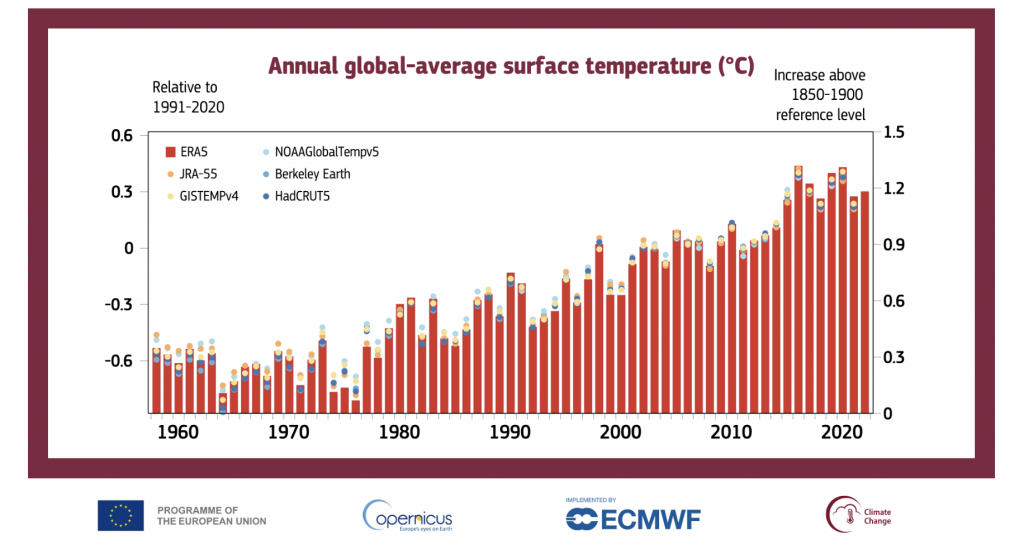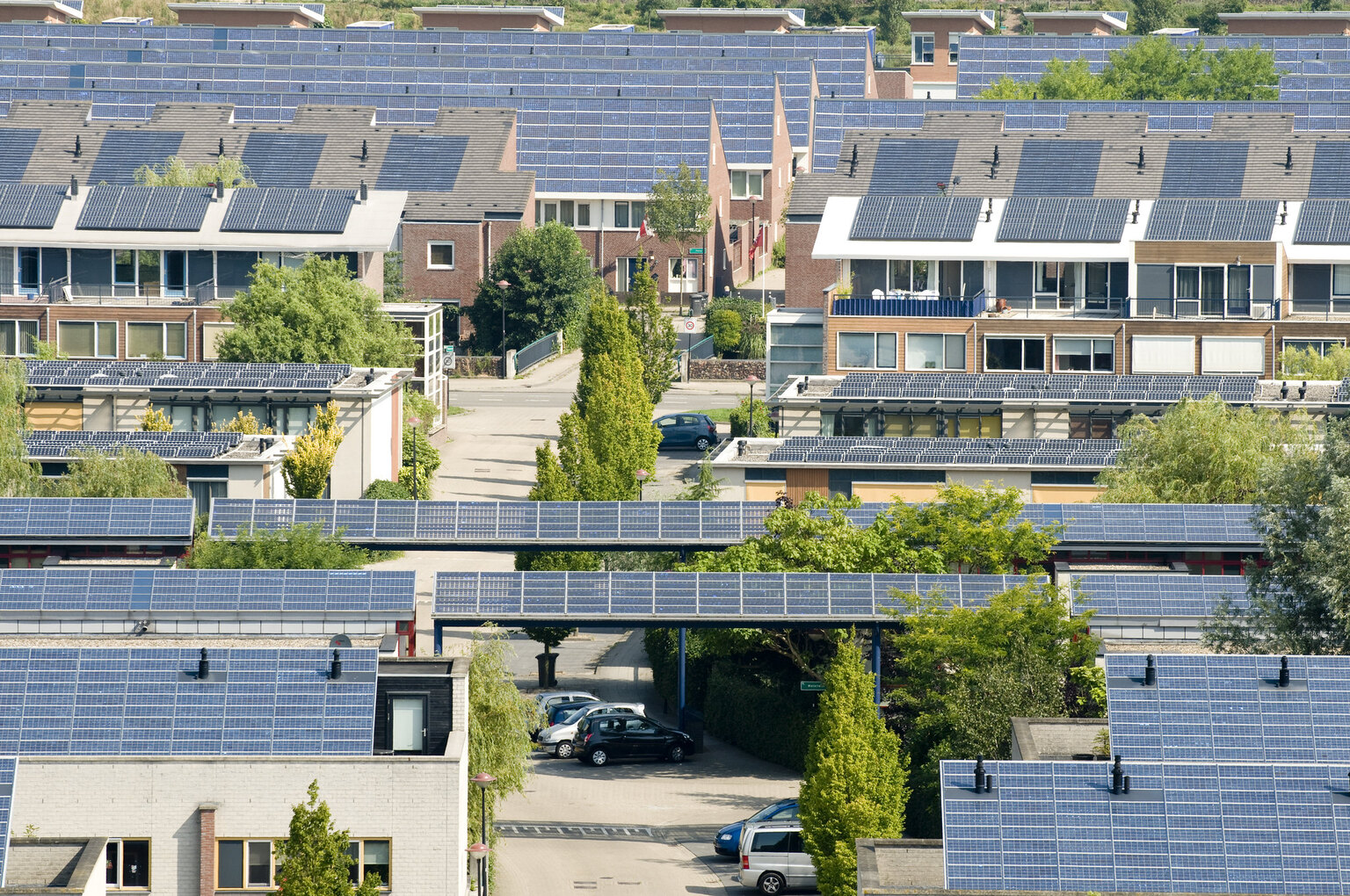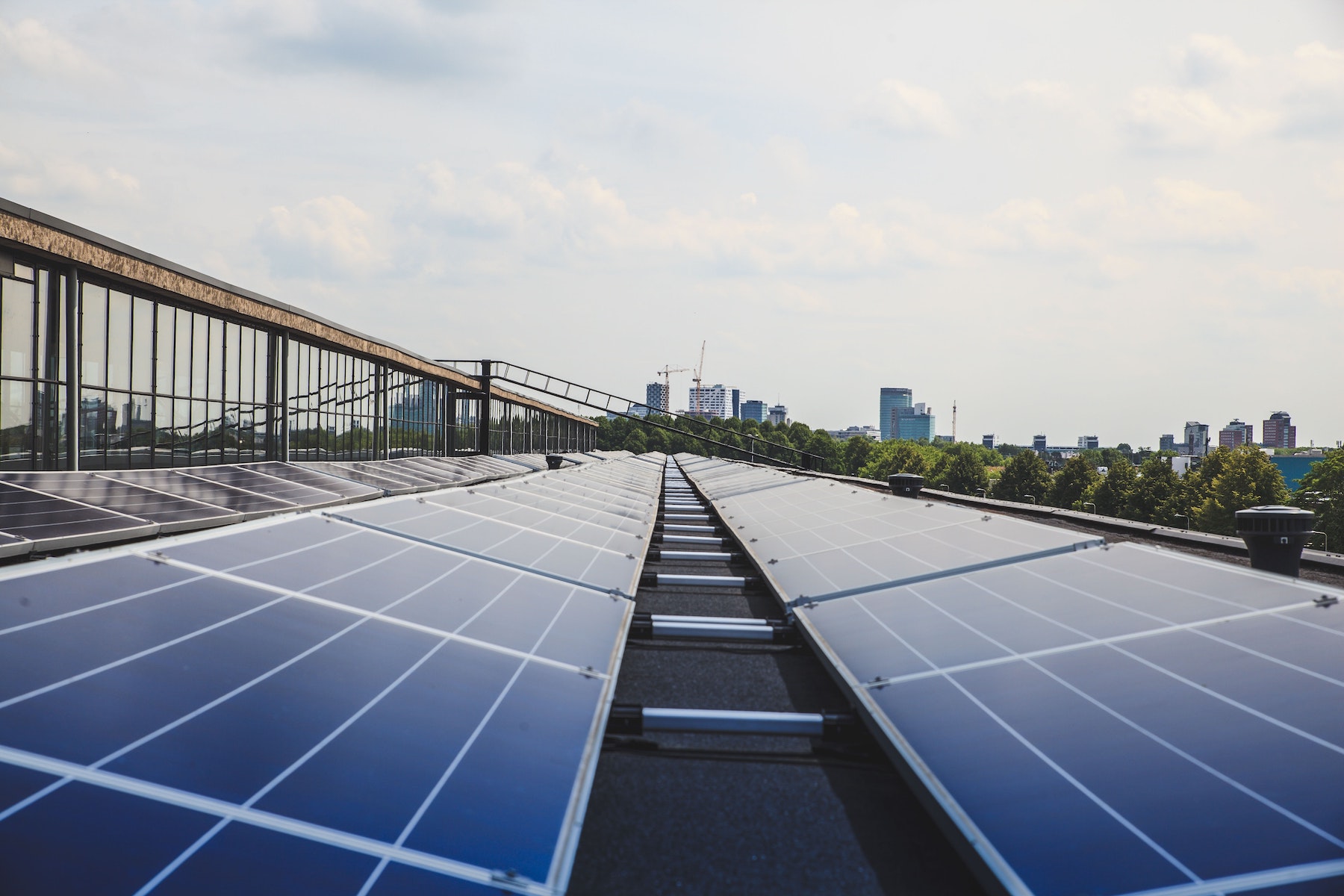2023 has hardly started, and Europe is already experiencing a record-breaking warm spell, picking up where it left off in 2022 when the continent recorded both its warmest summer on record and its second warmest year overall, exceeded only by that of 2020. Worrying signals that crystalized by the European Union’s Copernicus Climate Change Service, whose January 9 Global Climate Highlights Report shows that 2022 was the fifth-warmest year for the entire planet since records began and that the last eight years were the warmest on record.

Heatwaves carry major threats to human health and ecosystems and scientists predict that the future holds more frequent and severe ones in store for us as climate change continues to turn up global temperatures. Carlo Buontempo, the director of the Copernicus service, even explained to the New York Times that, “the rare event now would be to see a really cold year.”
The Report also emphasizes how we are currently in the third year of the weather pattern known as La Niña, which historically goes hand in hand with cold weather. So, what happens when this will give way to El Niño, which is expected to start in March and will bring warmer temperatures across the globe?
The New Yorker reports that: “James Hansen, who is sometimes referred to as the ‘father of global warming,’ made an alarming forecast […] when El Niño occurs, it will be like opening a globe-size oven door. ‘2024 is likely to be off the chart as the warmest year on record.’
Therefore, although it may feel like a single day doesn’t go by without news headlines dominated with reports of heatwaves and other extreme weather events, the way media reports these is still a sticky topic and one which can become crucial in determining public perceptions.
Just this summer Carbon Brief published an articulate appeal for media companies to improve the way in which they represent the climate risks inherent and represented by extreme weather events such as heatwaves. One would hope that the days when it is acceptable to represent a summer heatwave with pictures of people sunbathing happily on a beach are long gone, as the truth of heatwaves is less about piñacoladas and more about failing infrastructure, deteriorating human health and widespread environmental destruction.
Yet with the latest heatwave, which has been affecting both the northern and southern hemisphere, global media responses have presented a mixed bag with some even seeing the “sunny side” of things. Unfortunately, that sunny side is scalding hot.
Is there room for rejoicing?
When professional climatologist and weather historian Maximiliano Herrera, who has been investigating extreme weather events for the past thirty years and more recently documenting them on the “Extreme temperatures around the world” Twitter feed, wrote on January 2 that: “The mother of all extreme weather events is happening in Europe NOW” and that “this is the event which will rewrite the history of world climatology”, then you know something big is happening.
(1) The mother of all extreme events ever seen in Europe is NOW. 1st of many tweets coming.
In #France 113 January records so far!
Temperatures up to 24.9C at Trois Ville.
See list of only the 1st category stations (otherwise the list would be too long) of the records beaten. pic.twitter.com/QTfveMNQrO— Extreme Temperatures Around The World (@extremetemps) January 1, 2023
The first weeks of 2022 saw countless records boiled into thin air across Europe with staggering statistics such as hottest January days on record in Poland, Denmark, Czech Republic, Netherlands, Belarus, Lithuania and Latvia to mention just a few.
Although most media have been quick to report on the implications that this will have for human and planetary health, others were also just as happy to see the bright side.
The Economist opened on January 11 with “The energy crisis and Europe’s astonishing luck”, referencing the staggering heatwave as a “reason for cheer” as it has put the energy crisis that some feared would have spiraled out of control with a cold winter (courtesy of Russia’s invasion of Ukraine) has been put on hold. In an article that fails to even mention climate change, if not in an off-hand way at the end of the final paragraph, what remains astonishing is a failure to connect the dots between the energy crisis, climate change and the devastating heatwave.
A similar approach is taken by Bloomberg whose January 6 piece, “Winter Heat Wave Offers Reprieve from the Energy Crunch — For Now”, also strikes an upbeat tone, describing the warm weather in Europe, China and Japan as “a reprieve after months of worries that the energy crisis would leave thousands with insufficient heat.”
Although Bloomberg does a better job of balancing their take by quoting Bob Henson, a meteorologist with Yale Climate Connections and the author of the Thinking Person’s Guide to Climate Change, who explains that: “This winter’s mild spells will clearly help Europe get through a war-related energy crunch […] but at the same climate has also raised the odds of horrific European wildfires like those that struck last summer. We can’t pick and choose from the many downsides and the occasional upside of a changing climate.”
Most media feel the heat
The overwhelming majority of articles on the unfolding heatwave have, in fairness, seen past the potential positive short term implications for Europe’s energy crisis, recognising and emphasizing the climate implications that the extreme weather will have.
In European media a lot of the focus revolved around the implications that the heatwave is having for snow and ice cover and therefore ski resorts and local mountain economies. Numerous papers feature images of isolated white tongues snaking their way down grassy slopes, a sorry reminder of the past glories of ski resorts across the alps, that today rely increasingly on artificial snow to keep the tourism industry afloat.
In the UK the Daily Mail, Independent, Guardian and BBC all featured coverage of the impact of the heatwave on ski resorts across the Alps and all featured strong language of “crisis”, “record-breaking heat”, “most extreme”, as well as referencing the wider context: “Yet the heatwave should alarm us all. Though it may have been less punitive to experience than last summer’s record temperatures, which led to thousands of deaths, it has spread across many more countries,” writes The Guardian.
On mainland Europe coverage followed a similar trend with canceled World Cup ski races also taking many of the headlines as the hot weather forced numerous events in Germany, France and Switzerland to be postponed due to unsuitable weather conditions. Many of the articles make the link between the warm weather and man-made climate change and how low-altitude ski resorts will increasingly have to rely on expensive snowmaking to survive.
In one of the most sobering summaries of the current state of Europe’s 30-plus billion USD ski industry, Time magazine writes that: “by the end of this century, warns the Institute for Snow and Avalanche Research, only resorts above 2,500 meters will get enough natural snow to stay in business. Even at the Swiss resort of Davos, where the annual meeting of the World Economic Forum begins on January 16, snowpack remains meagre on the lower slopes.”
Yet the concern is not just limited to snow and tourism. Climatologists on Twitter were also unanimous in their reporting of the heatwave as a potentially shedwater moment. “One of the most severe winter heatwaves in Europe’s modern history visualized over the last 2 days,” meteorologist Nahel Belgherze said in his tweet. “Hundreds of monthly warm temperature records were broken all over the continent. This is exactly the kind of very abnormal event that is progressively rewriting global climatology.”
The heatwave currently hitting Europe is also not an isolated event. At the same time heatwaves are running through Australasia, South Africa and South America, with widespread consequences such as wildfires, drought and impacts on human health and local media outlets using correspondingly dire language to describe the events.
The worrisome #drought in South America continues#Agriculture 🌾 is heavily affected: the harvest could drop 📉 by 5⃣0⃣% in #Argentina in 2023
⬇️The #Parana River basin 🇦🇷🇺🇾 in ↙️ January 2022 and ↘️ January 2023, as seen by #Copernicus #Sentinel3 🇪🇺🛰️ pic.twitter.com/4dpXsiKBgq
— 🇪🇺 DG DEFIS #StrongerTogether (@defis_eu) January 10, 2023
Cover image: Copernicus – 2022 Global Climate Highlights






